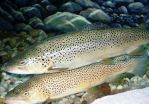(Press-News.org) Climate change, pollution, the extraction of water for irrigation and overfishing all threaten the survival of the common trout. This fish is very sensitive to changes in its environment and, according to the Spanish study, its habitat will have reduced by half by the year 2040 and will have completely disappeared from Iberian rivers by 2100, so its population will become extinct.
Global warming is threatening the existence of many fish species, especially those in the salmonid family, which are sensitive to temperature changes as they require clear and fresh water to live. According to the calculations of a study carried out at the Complutense University of Madrid (UCM), the habitat of the common trout (Salmo trutta) in the Iberian Peninsula will have practically disappeared by the year 2100.
Ana Almodóvar is a researcher and the lead author of the study published in the 'Global Change Biology' journal. It deals with how variations in temperature affect trout population both now and in the future. "This fish has very narrow physiological margins in which it can live and is therefore a good indicator of the highest stretches of our rivers," as explained to SINC by the expert.
The scientists analysed the temperature records of Navarra between 1975 and 2007 and using a mathematical model they calculated the temperature of the region's rivers. "We saw a clear tendency of temperature increases, which was particularly marked around 1986," outlined Almodóvar. In addition, the team monitored the trout populations of 12 rivers in the Ebro basin and saw that an increase in temperature was associated with a decrease in trout populations.
The biologist points out that "measurements are exact and temperature records are for long periods of time." Therefore, thanks to the collected data, the scientists have been able to create their forecast of the state of the trout in the future.
"In the best of cases, which would involve just slight climate changes, the situation for the trout is disastrous," confirms Almodóvar. The study states that the temperature increases in Spanish rivers will cause the trout to lose half of its habitat by 2040 and become practically extinct by the year 2100.
According to the research team, these results can be extrapolated to other regions of the Iberian Peninsula and the Mediterranean, such as the Italian, Balkan and Anatolian Peninsulas. "The Mediterranean region is very vulnerable to climatic variations and to the decrease in water availability," she adds.
An unrecoverable loss
"It has always been thought that due to climate change trout populations in Southern European countries would be more affected than those in the North. But, a specific study was needed to confirm this notion," points out Almodóvar.
Trout in the Iberian Peninsula displays great genetic variability and it is considered a hot point of biodiversity in the whole continent for this species. The expert explains that "the Hispanic river basins are very ancient and acted as a refuge for Europe's fauna during the Pleistocene ice ages."
Scientists report that this variability is not only under threat by climate change but also because "over the years Spain's rivers have been repopulated with genetically different types of trout."
"There is much allochthonous gene contamination amongst the native population of these fish since over time eggs have been imported from fish farms instead of developing the specific and pure lineage of each basin," adds the researcher with much regret.
One of the greatest threats: fishing
The scientists confirm that due to pollution, the use of fresh water for irrigation and an increase in temperature, "the ecologic state of rivers is more and more precarious and nowadays there are only trouts at the river sources."
Furthermore, trout is a priority species in recreational fishing in Spain and represents a "very important" socioeconomic resource. Almodóvar outlines that there is more and more demand for trout fishing and studies have been warning of the problems of overfishing for years.
"A common characteristic of populations subject to recreational fishing is that there has been a decrease in the oldest specimens since they are captured for being the largest," concludes the expert.
INFORMATION:
Reference:
Almodóvar, A.; Nicola, G.G.; Ayllón, D.; Elvira, B. "Global warming threatens the persistence of Mediterranean brown trout" Global Change Biology 18: 1549. DOI: 10.1111/j.1365-2486.2011.02608.x 2012
Trout will become extinct in the Iberian Peninsula in less than 100 years
2012-09-05
ELSE PRESS RELEASES FROM THIS DATE:
Infections in rheumatoid arthritis patients: Mayo Clinic study finds way to pinpoint risk
2012-09-05
ROCHESTER, Minn. -- Rheumatoid arthritis alone is painful and disabling, but it also puts patients at higher risk of death. The greater susceptibility to infections that accompanies the autoimmune disorder is one reason. Assessing the danger of infection a particular patient faces so it can be addressed can prove challenging for physicians. A Mayo Clinic study finds that a risk score can be developed to predict a patient's chances of having serious infections. The score uses information about how rheumatoid arthritis is affecting a patient, plus factors including age, corticosteroid ...
Epigenetic causes of prostate cancer
2012-09-05
This press release is available in German.
In about half of all prostate tumours, there are two genetic areas that are fused with one another. When this is not the case, the exact way cancer cells originate in prostate tumours was not clear until now. Scientists at the Max Planck Institute for Molecular Genetics in Berlin, in cooperation with a team of international researchers, were able to show that the genesis of this fusion-negative prostate cancer has epigenetic causes: methyl groups are distributed differently over the DNA in the cancer cells than in healthy cells. ...
Harnessing anticancer drugs for the future fight against influenza
2012-09-05
Medical Systems Virology group at the Institute for Molecular Medicine Finland (FIMM) at the University of Helsinki, together with its national and international collaborators, developed a new cell screening method that can be used to identify potential anti-influenza drugs. The researchers were able to identify two novel compounds with anti-influenza activity, obatoclax and gemcitabine and prove the efficacy of a previously known drug saliphenylhalamide.
The study was recently accepted for publication in the Journal of Biological Chemistry and is now available online.
Influenza ...
DNA sequences need quality time too - guidelines for quality control published
2012-09-05
Like all sources of information, DNA sequences come in various degrees of quality and reliability. To identify, proof, and discard compromised molecular data has thus become a critical component of the scientific endeavor - one that everyone generating sequence data is assumed to carry out before using the sequences for research purposes.
"Many researchers find sequence quality control difficult, though", says Dr. Henrik Nilsson of the University of Gothenburg and the lead author of a new article on sequence reliability, published in the Open Access journal MycoKeys. ...
Archaeology team announces 'huge step forward' in King Richard III search
2012-09-05
Archaeologists from the University of Leicester who are leading the search for King Richard III have announced they have overcome the first significant hurdle of their investigation – and made a huge step forward in the search for the King by locating the church where he was buried.
The University of Leicester is leading the archaeological search for the burial place of King Richard III with Leicester City Council, in association with the Richard III Society.
In 1485 King Richard III was defeated at the battle of Bosworth. His body, stripped and despoiled, was brought ...
Study uncovers simple way of predicting severe pain following breast cancer surgery
2012-09-05
WOMEN having surgery for breast cancer are up to three times more likely to have severe pain in the first week after surgery if they suffer from other painful conditions, such as arthritis, low back pain and migraine, according to a Cancer Research UK study published today (Wednesday) in the British Journal of Cancer.
Of the women surveyed, 41 per cent reported moderate to severe pain at rest, and 50 per cent on movement, one week after their surgery. Most patients having breast cancer surgery are discharged home by this time.
Psychological state was also important, ...
When do we lie? When we're short on time and long on reasons
2012-09-05
Almost all of us have been tempted to lie at some point, whether about our GPA, our annual income, or our age. But what makes us actually do it?
In a study forthcoming in Psychological Science, a journal of the Association for Psychological Science, psychological scientists Shaul Shalvi of the University of Amsterdam and Ori Eldar and Yoella Bereby-Meyer of Ben Gurion University investigated what factors influence dishonest behavior.
Previous research shows that a person's first instinct is to serve his or her own self-interest. And research also shows that people are ...
Children exposed to 2 phthalates have elevated risk of asthma-related airway inflammation
2012-09-05
Children exposed to diethyl phthalate (DEP) and butylbenzyl phthalate (BBzP)—phthalate chemicals commonly found in personal care and plastic products—have elevated risk of asthma-related airway inflammation, according to researchers at Columbia Center for Children's Environmental Health (CCCEH) at the Mailman School of Public Health.
Of the 244 children aged 5 to 9 in the study, all had detectable levels of phthalates in their urine although these varied over a wide range. Higher levels of both phthalates were associated with higher levels of nitric oxide in exhaled ...
Telaprevir: Added benefit in certain patients with hepatitis C
2012-09-05
The drug telaprevir (trade name: Incivo®) has been available for treatment of chronic hepatitis C infection of genotype 1 since autumn 2011. In an early benefit assessment pursuant to the "Act on the Reform of the Market for Medicinal Products" (AMNOG), the German Institute for Quality and Efficiency in Health Care (IQWiG) examined whether telaprevir offers an added benefit compared with the present standard therapy.
According to the findings of the assessment, the new drug telaprevir offers advantages in various groups of patients with chronic hepatitis C infection ...
New study examines how ocean energy impacts life in the deep sea
2012-09-05
Durham, NC — A new study of deep-sea species across the globe aims to understand how natural gradients in food and temperature in the dark, frigid waters of the deep sea affect the snails, clams, and other creatures that live there.
Similar studies have been conducted for animals in the shallow oceans, but our understanding of the impact of food and temperature on life in the deep sea — the Earth's largest and most remote ecosystem — has been more limited.
The results will help scientists understand what to expect in the deep sea under future climate change, the researchers ...




